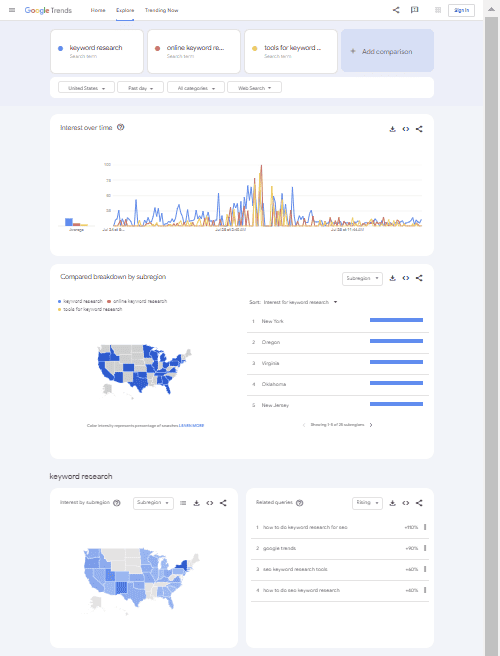Going Beyond the Tools: Alternate Keyword Research Strategies
You don’t have to be an SEO expert to understand the importance of performing thorough keyword research when creating targeted content for businesses. When it comes to tools that can help, there are plenty of options out there from Google’s own Keyword Planner, to SEMrush, Ahrefs, and many more that can all provide valuable data on factors like search volume, competition, and related keywords.

Can keyword research be done without a tool?
What about those times when you’re working on content for a business that is particularly niche, or offers a product that doesn’t have a lot of history? In these scenarios, those tools will simply not access enough historical data to provide you with much in the way of data backed recommendations.
How do I manually search for keywords?
SEO content creators need to go beyond these typical tools and explore alternative approaches in these situations. Let’s take a look at some alternate methods for keyword research strategies that will not only help in these cases, but can also supplement traditional tool-based methods you already use to uncover untapped opportunities, target niche audiences, and effectively optimize content.
Step 1: Start building your potential keyword lists
Search Like The People: Start With Common Sense Keywords
Let’s start simple – how would you search? Well… maybe not you, specifically. If you’ve been in the SEO game for any notable length of time, you may be a bit of a power user. So forget all those search operators, shortcuts, and long tail qualifiers and do a little role playing as a typical customer. Content creators should always start with a burst of creativity and good old-fashioned common sense. Brainstorming and generating a list of relevant keywords based on your own knowledge and understanding can be a great first step. This approach can also reveal industry-specific terms and audience-specific phrases that might not surface in conventional keyword research tools.
Hang Out With The People: Online Forums and Communities
For niche businesses with limited search volume, engaging with and understanding various online audiences can be an invaluable resource. Some of these audiences may include:
- Theme-specific reddit groups,
- Online forums and communities,
- A company’s own help or support site
- Social media groups.
These places will often offer direct interactions with the target audience, providing insights into their language, terminology, and specific pain points. Content creators can use this information to tailor content and improve its relevance to these niche audiences. But be careful to just observe: these communities are usually not a good place to ask marketing related questions of their members as they tend to dislike “salesy” discussions.
Listen to The People: Get Some Customer Feedback
If possible, conduct interviews or surveys with existing customers to gather in-depth insights into their needs, challenges, and the search terms they use. This firsthand input can identify keywords or phrases that resonate within the niche and help guide content creation efforts. The next best option is talking to members of the sales team to see if they can provide insights on common questions, hurdles, or concerns that customers express. Last but not least, check those review sites to see how people discuss the products or services to once again identify potential needs, pain points, or key aspects that are well received to ideate potential keywords.
Shop Like The People: Analyze Competitors in the Same Space
Competitor analysis is always an excellent method to gain inspiration and ideas for content creation. By checking out competitor websites and content within the same niche, you can identify the types of keywords they target, the topics they cover, and the level content they create to help get your bearings.
Step 2: Let’s Get Some Validation (And Look for More Terms)
Google’s Suggested Searches
Now take some of those “common sense” terms and start Googling (or Binging if that’s your thing). Start wide and broad to see where the rabbit hole leads, and if you start seeing results in line with the expectations based on your initial list, then you’re on the right track. A search engine’s “suggested searches” and even their autocomplete features can provide a treasure trove of information. They are privy to tons of data on what people type when they search, so these suggested insights can provide valuable ideas for keywords and the related queries that people commonly search for. This real-time approach can provide timely insights into popular and trending search queries, helping you build out your keyword lists and ensure your content strategies are topical, relevant, and engaging.

Are You Asking The Right Questions?
More importantly, can you provide the best answer? Google’s “People Also Ask” (PAA) is a feature in search results that shows users related questions and answers based on their initial search query, and these recommendations are extremely useful for keyword research and content creation. By reviewing these related questions, you will better understand user intent and can identify areas where you can provide content to address the precise needs of your target audience. In many cases, the questions you find in PAA results could be a perfect opportunity for a new blog post, article, or consumer guide that answers the specific concerns of searchers.
What’s Trending Right Now?
Google Trends can provide valuable insights into the popularity and interest of specific search terms over time. Even though it won’t give you exact numbers, you can still use it to validate your list of potential target keywords. As the name implies, Google Trends helps identify trends over time so it can help you:
- Understand the seasonality of certain keywords
- Compare several keywords for differences in performance
- Gather regional insights
- Seerelated queries to your target keywords
By analyzing these various trends and related queries, you can make informed decisions about which keywords you may want to target.
A Quick Note
While these approaches are great for keyword research, they do have a few caveats you’ll want to keep in mind. Common sense keywords may not cover the full spectrum of relevant search terms, and Google’s suggestions can be influenced by personalized search history. To maximize the effectiveness of these keyword research tactics be sure to go use a web browser that offers an “Incognito Mode” or allows for a generic “Guest Profile.”
Step 3: Refining Your Lists With a Few Best Practices
Focus on Long-Tail Keywords
Niche businesses may not garner large potential keyword pools and there may be few broad terms to utilize, but they can leverage the power of long-tail keywords. These keywords may have lower search volumes (or in some cases no historic data individually), they often have high intent and can be extremely valuable for driving highly qualified traffic. Remember, if Google thought a long-tail keyword was worthwhile enough to “suggest” or provide a “People Also Ask” result for, then that means enough people are searching for the term for it to become relevant. By addressing these long-tail queries, content creators can often attract a more relevant visitor that is likely to have better engagement on your site.
Incorporate Localized and Geo-Specific Keywords
For businesses with a regional focus, be sure to incorporate those localized and geo-specific keywords. This approach ensures your content is seen as relevant to local searchers, which increases the chances of driving more qualified traffic.

Good keyword research is at the core of effective SEO strategies
Utilizing out of the box approaches for keyword research allows you to create meaningful and relevant content for your target audience. While the standard keyword research tools are great to use in most cases, advanced keyword research strategies go beyond these tools, and are necessary to provide a deeper understanding of niche audiences and to uncover untapped opportunities.
By combining personal insights, competitor analysis, long-tail keyword exploration, customer engagement, and some good ol’ legwork, you will enhance your research efforts and optimize your content to build unmatched topical authority that maximizes organic search visibility.










